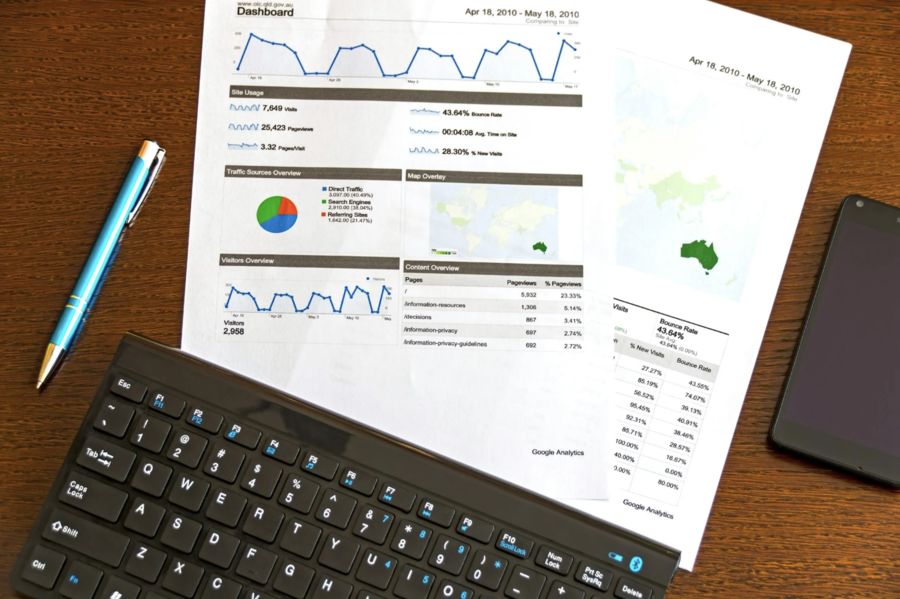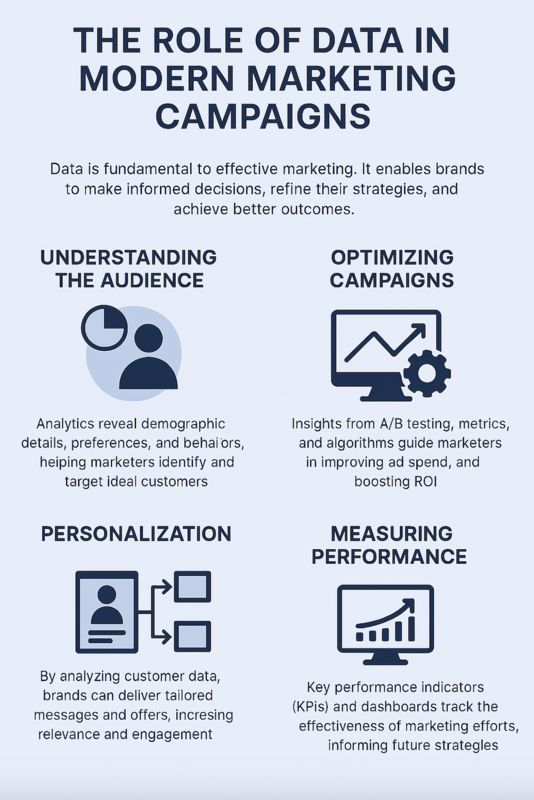
In the era of digital transformation, data has emerged as the cornerstone of effective marketing. Modern marketing campaigns no longer rely on intuition or guesswork; instead, they are built on insights derived from data—data that informs, personalizes, and optimizes. From audience segmentation to real-time campaign adjustments, data plays an integral role in every phase of a marketing initiative.
The Shift from Traditional to Data-Driven Marketing

Historically, marketing was about broad targeting and mass messaging. Brands cast wide nets with TV commercials, print ads, and billboards, hoping to resonate with a segment of the audience. Today, that landscape has evolved dramatically. The modern consumer interacts with brands across dozens of touchpoints, and every interaction leaves a digital footprint.
This footprint—comprised of clicks, views, shares, purchases, and more—forms a rich tapestry of behavioral data. Smart marketers now harness this information to tailor messaging, time outreach, and align content with user intent.
Data as the Foundation of Audience Understanding
Before a campaign even launches, data helps marketers answer the most critical question: Who are we targeting? Customer data platforms (CDPs) and customer relationship management (CRM) tools collect demographic, psychographic, and behavioral data that segment audiences based on interests, habits, and purchasing patterns.
With precise segmentation, marketers can create personalized experiences that resonate more deeply. A millennial seeking eco-friendly products, for example, should be served different creative and messaging than a Gen X professional interested in luxury travel.
Real-Time Optimization and Agility
One of the most transformative benefits of data in marketing is real-time campaign optimization. Platforms like Google Ads and Meta allow marketers to track performance metrics on the fly: click-through rates, conversion rates, bounce rates, and more.
Using A/B testing and multivariate experiments, marketers can determine which headlines, visuals, or calls-to-action are most effective. Budgets can be reallocated in real time to favor high-performing channels or creatives. This dynamic approach minimizes waste and amplifies results.
Personalization at Scale
Personalization is no longer a novelty—it’s a necessity. According to research, 80% of consumers are more likely to purchase from a brand that offers personalized experiences. Data enables marketers to deliver relevant content, product recommendations, and offers that align with individual preferences.
Email campaigns, for instance, can be tailored based on browsing history or purchase behavior. Even website content can shift dynamically based on location, referral source, or previous engagement. This level of personalization builds trust, enhances user experience, and increases conversion rates.
Attribution and ROI Measurement
Data also plays a pivotal role in attribution—understanding which channels, messages, or touchpoints contribute most to conversions. Multi-touch attribution models give credit to every step in the buyer’s journey, not just the last click.
This granular insight allows marketers to assess return on investment (ROI) with greater accuracy. By identifying what’s working (and what’s not), brands can fine-tune future campaigns for better performance.
Predictive Analytics and Forecasting
Beyond retrospective analysis, modern marketing is increasingly forward-looking. Predictive analytics uses historical data and machine learning to forecast future behavior. For example, it can anticipate when a lead is likely to convert, which customers are at risk of churn, or what content topics are likely to trend.
This predictive power helps brands make smarter decisions, proactively address challenges, and uncover new opportunities before competitors do.
Data Ethics and Privacy Compliance
With great power comes great responsibility. As marketers harness vast amounts of consumer data, ethical considerations and privacy regulations must remain top of mind. Transparency, consent, and compliance with laws like GDPR and CCPA are not just legal requirements—they’re critical to maintaining customer trust.
Modern campaigns should be built on a foundation of responsible data usage, incorporating opt-in mechanisms, clear privacy policies, and secure data handling practices.
Final Thoughts
Data is not just a tool; it’s the engine of modern marketing. It empowers brands to understand their audience, craft relevant messages, and adapt to ever-changing consumer behavior. By leveraging data thoughtfully and ethically, marketers can create smarter, faster, and more impactful campaigns.
As the digital ecosystem becomes more complex, the marketers who win will be those who not only collect data but know how to interpret, act on, and protect it. In a landscape shaped by information, insight is the true competitive edge.
